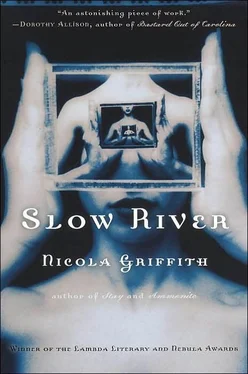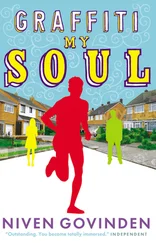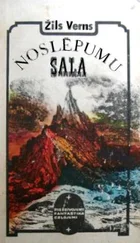I tilted the watering can into the pot of my ficus tree, watching the brown, granular soil darken and smooth out as it absorbed the water. I sprayed the leaves, wondering when the light green of the leaves grown in the summer, summer when I had left Spanner, had blended with the seasoned, deeper green of all the others. And then I cried.
I was still crying when I went into the bathroom. It was small, painted peach and cream, and everything in it was clean, but somehow it still reminded me of the bathroom Spanner and I had shared. Even the mirror, which was new and square.
I turned the cold tap, splashed my face. Enough, I told myself sternly. But how could it be enough when even the clear, cold water streaming into the sink reminded me of the first time I went into Spanner’s bathroom? How could it be enough when I looked into the mirror and even the hair framing my face was the fox red Spanner had chosen?
I looked at my hair more closely and sighed. The gray roots were beginning to show again. That would have to be fixed before I went to my new job.
I had never liked red. I would buy some brown dye, and I would let my eyebrows grow back. Symmetrically.
* * *
Lore’s back was healed and her hair was a different color. She was as disguised as she was going to get. She was getting restless. She had been inside the flat for several weeks and, before that, the kidnappers’ tent. Now she was afraid to go outside. She sat by the livingroom window and watched the sky as it turned to November gray, and shuddered. It was so big, so open. She tried to imagine being out under the whipping clouds, among the people who all seemed to be hurrying toward destinations she could only guess at. But she had nowhere to head for. And she would be without a slate, without a real identity, with no one to call if she found herself in trouble. And people might recognize her, might stare and point…
She went into the kitchen to make coffee, try and distract herself. The weeds down in the back garden were turning yellow. She stared at them while the coffee bubbled. Weeds, interlopers, were always the last to die. They started small, but after a year or two they made themselves belong, put down strong roots.
Trying not to think about what she was doing—or she would panic—Lore went into the tiny hallway and pulled on one of Spanner’s jackets. She did not pause to zip it up. She had to think for a moment before she could remember the door code Spanner had given her three weeks ago; then she opened it and went out.
The stairwell was damp, and funneled the cold November wind right through her thin jacket. But it was still enclosed.
The hard part was reaching the street. People passed her, not looking, but she still felt horribly exposed. She was breathing hard.
The cut-through was five yards to her left. She ran. It was a brick-lined tunnel under the overhanging flat, about eight feet high and less than a yard wide. Her footsteps echoed.
At the other end was a gate. It was shut. She rattled the door. The knob came off in her hand, the wood was so rotten. She kicked it. The door split open. The wood smelled fruity and spoiled. She went through and lifted it back into place as well as she could. She was probably the first person to set foot back here in years.
It was hard to tell what had once grown here a hundred, maybe a hundred and fifty years ago when the row of large houses had originally been built. It looked as though no one had cultivated the place for a long, long time. Judging by the assortment of ancient appliances and precode concrete rubble, the place had been used as a tip for the last two or three decades. But everywhere—by the rusting washing machine, between the old tires, in between the broken paving stones—sprung weeds and small saplings. There were brambles and the remnants of what might once have been a rose garden. She squatted down by the tangle of thorns. They might be the variety that bloomed at midwinter.
This close to the ground she could smell the dark, cold, loamy dirt, a clean smell, one that reminded her of being small, watching while one of the van de Oest gardeners planted tulip bulbs. She dug her fingers into the leaf mold. It felt just the same.
There was a rotted-out lean-to by one wall. She poked at it, looked at the hole in the roof. It wouldn’t be too hard to waterproof it enough for gardening tools.
She stood in the middle of the barren garden, surrounded by walls and broken glass, and smiled. She felt safe here. Many of the windows of the surrounding commercial buildings had been bricked up. Unless someone looked down from Spanner’s bathroom or kitchen, no one could see her. She looked up at the windows. They were blank, reflecting only the scudding sky.
She waited until Spanner had taken off her shoes, then told her she wanted to do something with the garden.
“Like what?”
“Clear it first. Then see.”
“You’ll need all kinds of equipment.”
“Not as much as you think. And besides, you said you’d get me anything I needed.” It was a challenge. Lore remembered the weeds.
Spanner smiled and pulled a slate to her. “Give me your shopping list, then.”
“A shovel, spade, rake, trowel.” Lore pictured the gardeners at Ratnapida. “A wheelbarrow. Heavy gloves. Some shears. Grass seed, Other things when I’m ready to plant.”
* * *
The Hedon Road night shift ended at two in the morning. I was exhausted, so tired I could barely manage to unstrap my back support and the wrist and forearm splints. My arms felt leaden as I stripped off my skinny and showered. I was too tired to bother drying my hair. I regretted it as soon as I stepped out of the ugly pseudo-Victorian plant gates.
It was cold, and mist made the streetlights smeary; the kind of night that reminded me that in this northern city, autumn was just an eyeblink between summer and winter. At this time in the morning, all the passenger slides would be garaged at the far end of town. I would probably freeze if I had to wait for one to answer a request tapped in at a roadside pole. Besides, until I got paid—until I was sure my records would hold long enough to get paid—I would have to be careful with my money.
A special call-out would mean a large debit from my PIDA. Six months ago I would just have jumped a ride on a freight slide. I knew all the times and delivery routes—Hedon Road, then Springbank, then Princes Avenue—but with my new PIDA it was no longer worth the risk. If I got caught, there would be a blemish on my record that could cost me my job. That would mean a new PIDA… and where would it ever end?
I was tired, but there was something about walking at night, when the streets were empty: my strides felt longer, stronger, and the cold made even my breath tangible. I was real. I was here. Nothing was complicated anymore. I no longer had to be ashamed. I was Sal Bird, aged twenty-five, and I worked for a living.
But when I got back to the flat I had to climb five flights of stairs, and when I opened the three locks on my door and turned on the lights, one of the first things I saw was my Hammex 20 camera and the edit box, and I remembered it wasn’t over yet, that Spanner still wanted payment.
In the kitchen I snipped the corner off a plastic bag and poured half a pound of soybeans into a pan. They smelled of dust, and rattled on the metal as I filled the pan with water. As the water heated, the bean skins suddenly wrinkled, as though the outside absorbed water faster than the rest. The water boiled, and the beans began to rock, and some swelled before others, so it looked as though they were crawling over each other. In the space of minutes what had been hard, shiny ivory ball bearing plumped out into sleek alien ovoids curled up like so many fetuses. Like frog eggs in the desert hatching in a sudden downpour. And I laughed.
Читать дальше












